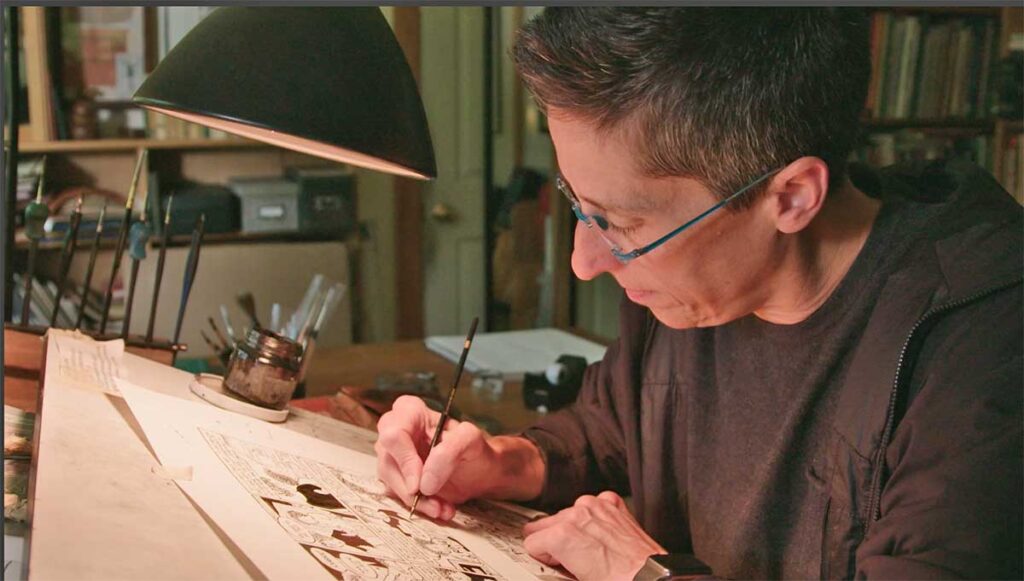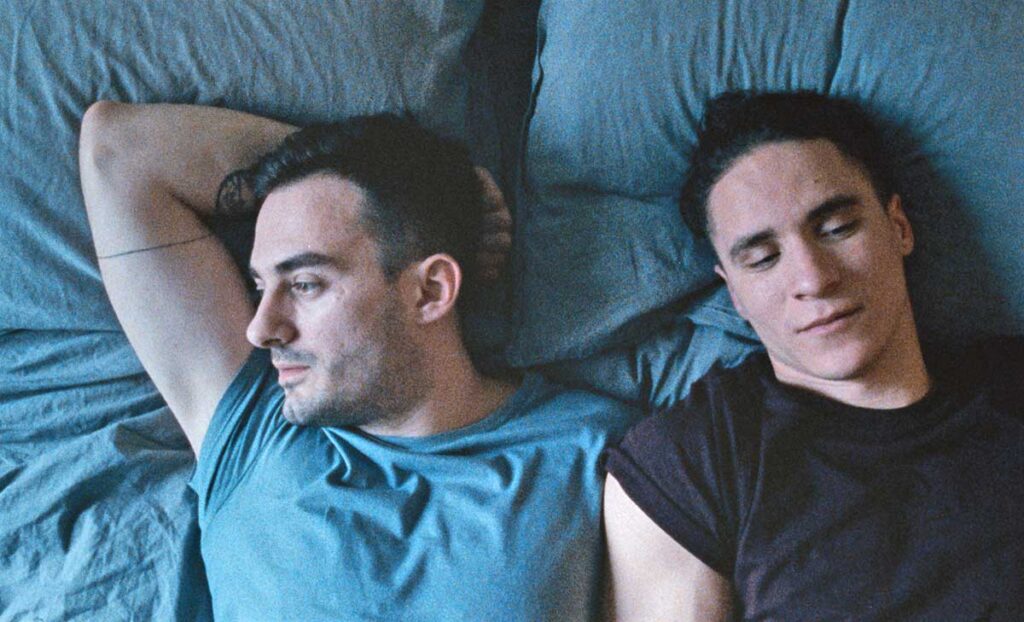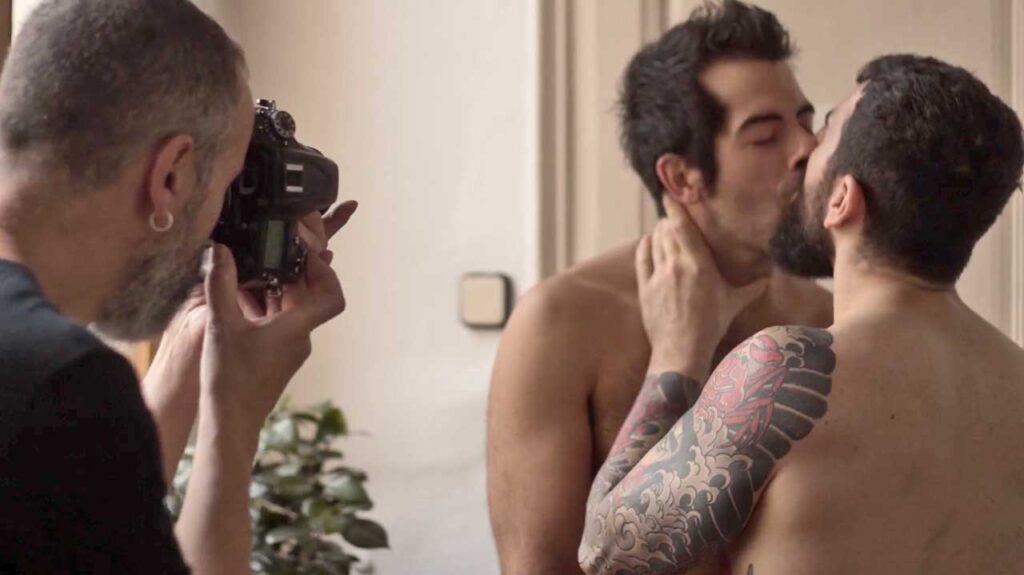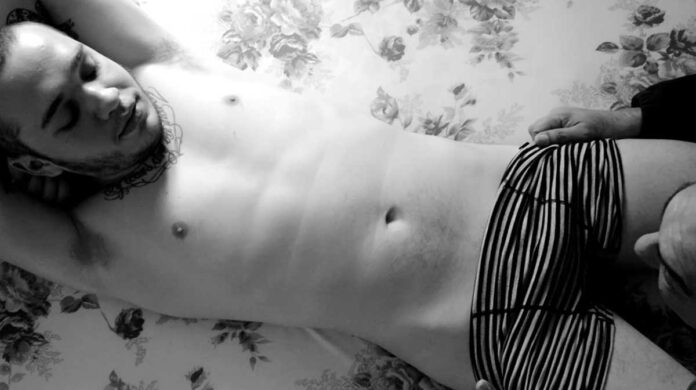qFLIX is hosting its fall film festival both online and at the Suzanne Roberts Theatre, 480 S. Broad Street, September 26 to October 3. The program includes dozens of features, documentaries, and shorts by, for, and about LGBTQ+ folks. With a few possible exceptions, all the theatrically-presented films will also screen online, sometimes with restricted availability. In addition, dozens of other films will also be available exclusively on the qFLIX online platform.
The festival opens with the Philadelphia premiere of “Jump, Darling,” writer/director Phil Connell’s sensitive tale of a Russell (Thomas Duplessie), a drag queen, who escapes to his grandmother Margaret’s (Cloris Leachman) country house after breaking up with his boyfriend Justin (Andrew Bushell). Margaret and Russell develop a rhythm in their lives together. He finds work at a local gay bar and helps Margaret who wants to live at home and not in an eldercare facility. Duplessie’s drag performances are a highlight and his budding romance with Zachary (Kwaku Adu-Poku) is sweet, but most viewers will appreciate Leachman’s delicate (and sometimes foulmouthed) performance here.
qFLIX will host the World Premiere of “Postcards Over the Skin,” an intimate and erotic drama by writer/director Pablo Oliverio that pays homage to the late gay Argentine author Manuel Puig. Shot almost entirely in arty and gritty black-and-white, the film has Carlitos (Railan Da Silva), a young Brazilian guy, meeting his older Uruguayan lover Carlos (Jorge De Vitta) for an extended tryst in a Buenos Aires hotel room. This romance features many tender, playful, and sexy moments, from the opening scene of Carlitos in bed, to a collage of images of the couple at the film’s end. Oliverio and the actors deftly capture the lovers’ palpable sense of desire in this striking low-budget film.
Not to be missed is the enchanting Italian import, “Mascarpone,” a gay reworking of “An Unmarried Woman.” Antonio (Giancarlo Commare) is set adrift when Lorenzo (Carlo Calderone), his husband of 12 years, tells him, “It’s over.” Forced to move out, Antonio moves in with Denis (Eduardo Valdarnini), and gets a job in Luca’s (Gianmarco Saurino) bakery. These “guardian angels” provide Antonio with sensible life lessons and guidance so he does not “hide in someone else’s shadow.” While Antonio struggles with work and romance, he eventually connects with Thomas (Lorenzo Adorni) and must decide what he really wants in life. Co-writer/directors Alessandro Guida and Matteo Pilati have served up a charming film that, like the title ingredient in tiramisu, is both sweet and comforting.

Another highlight is the affectionate documentary, “No Straight Lines: The Rise of Queer Comics” traces the careers of five groundbreaking gay and lesbian comic book artists. Director Vivian Kleiman — a Philadelphia native and proud graduate of Girl’s High — shows how these artists defined themselves and took risks to create a queer comics scene that is in full bloom today. There are charming anecdotes by the pioneering Mary Wings, who responded to reading the comic “Sandy Comes Out” by creating “Come Out Comix.” The late Howard Cruse describes how the underground comics scene allowed for queer and envelope-pushing work since the Comics Code restricted any mention of homosexuality. Rupert Kinnard explains how his work in college creating the Brown Bomber — the first gay superhero in comic strips — was “cathartic” as it enabled him to come out too. Jennifer Camper gets emotional talking about the AIDS epidemic, and Alison Bechdel speaks about destigmatizing the LGBT community through realistic illustrations and stories. As “No Straight Lines” shows, these artists “drew themselves as they wanted to be represented,” and in doing so changed the landscape and formed a strong sense of community. Kleiman employs comic panel formats to allow the next generation of queer comic book writers, which include Carlos Quispe, Ajuan Mance, and Maia Kobabe, among others. This is a fun doc that should inspire viewers to seek out these artists’ work.
Among the festival’s international selections, the lesbian entry, “Two,” from Israel, has Bar (Agam Schuster) asking her wife Omer (Mor Polanuer) if she wants to have a baby. Omer is thrilled by the idea of starting a family together and the two women start picking out sperm donors from an agency. But after several failed attempts at conception, the stresses, doubts, and difficulties start to strain the couple’s relationship. “Two” gets viewers rooting for the women, and writer/director Astar Elkayam tackles this sensitive subject with intelligence and care, getting at the way Bar can calm Omer down, but also how Bar can be tempted by a coworker, and jealous of a possible known sperm donor. “Two” is an engaging and well-acted drama that deserves a look.
Another story about baby-making is “Isaac,” which opens with Nacho (Pepe Ocio) and Denis (Iván Sánchez) reuniting 20 years after they were friends as teenagers. Denis asks to borrow money from Nacho. Nacho’s wife, Marta (Maria Ribera) wants a child. A win-win plan is made: If Denis’ girlfriend, Carmen (Erika Bleda), will be a surrogate for Marta and Nacho, they will compensate the couple. The first half of this glossy, soapy Spanish drama (based on Antonio Hernández Centeno’s play) sets up this arrangement, but then things change — Nacho and Denis act on long dormant passions. The bisexual relationship dynamics soon bring the drama to a head.

In “Poppy Field,” the striking feature debut by Romanian director Eugen Jebeleanu, the closeted Cristi (Conrad Mericoffer) is first seen spending time with his French lover Hadi (Radouan Leflahi), who is visiting him in Bucharest. When Cristi, a cop, heads off to work, he is forced to resolve a standoff in a movie theater where an ultra-nationalist, homophobic group has disrupted the screening of a queer film. During the extended sequence, Cristi attacks a gay man who could out him, forcing the cop to be exiled in the theater as the situation is resolved. One by one, various colleagues babysit Cristi, and they try to calm him down. Each recounts a story of acceptance that never explicitly acknowledges what Cristi most fears. It’s a canny approach, and it culminates in a quietly powerful ending. Jebeleanu shoots with a handheld camera to capture Cristi’s emotions and expressions in what feels like real time. Mericoffer gives a remarkable performance; he is completely unselfconscious playing someone who is incredibly self-conscious and confronted with his own fears.
“At the End of Evin” is a fascinating Iranian feature about Amen (Mehri Kazemi), a transgender teen who is hoping to get sexual reassignment surgery. She connects with Naser (Madhi Pakdel), who will pay for the operation if Amen poses as his daughter. It would spoil this intriguing film to say more, but the filmmakers, Mehdi and Mohammad Torab-Beigi, employ an effective gimmick where the camera presents Amen’s point of view for the entire running time.
On the documentary front, qFLIX has some fantastic offerings. “This is Jessica” is a heartfelt portrait of transgender activist Jessica Marie Bair, who grew up in the Mormon church. Director Andrea Meyerson’s film painstakingly recounts Jessica’s experiences in the church and in the military before transitioning; her relationships with her wife, lovers, friends, and children; and her advocacy with the Human Rights Campaign. There are also numerous discussions of the Mormon church’s attitudes toward the LGBT community and Jessica’s faith and excommunication, providing yet another critical look at the tensions between sexuality and religion.
“A Sexplanation” is Alex Liu’s illuminating and funny documentary about sex education. Liu participates in multiple conversations with friends, family members, and researchers about what we know — and how we learn about sex to see how it impacts people’s lives. There are enjoyable discussions about topics ranging from masturbation, to the pornography we consume, to issues of shame and consent, and ultimately, why and how we need to talk more openly about sex to increase everyone’s pleasure.

Sex and pleasure are also the theme of Alberto Fuguet’s intimate documentary “Everything at Once,” about Paco and Manolo, who publish the erotic photography publication “Kink.” Fuguet interviews the couple about their lives and the evolution of their thirty-year career, and some of his questions are quite probing. (The filmmaker’s curiosity is infectious). As the guys talk about coming out to their families or describe how armpits in a photograph suggest “an offering,” they come across as sweet, almost bashful gay men. The models are equally charming answering Fuguet’s questions about the experience and implications of posing nude. The various improvised photo shoots, ahem, reveal the thoughtful behind-the-scenes process of creating an erotic pictorial. “Everything at Once” is chock full of artful images, but it also contains some more explicit content.
“Pieces of Us” is director Cheryl Allison’s compassionate documentary about LGBTQ hate crime survivors. The four case studies include Jipsta (aka JP Masterson), who was gay bashed on a New York subway platform; Mykel, who was attacked and is recovering from trauma; Leia, whose 9-year-old son took his own life after classmates bullied him for being gay; and Prince Manvendra Singh Gohil of India, who suffered discrimination after coming out. This interview-heavy documentary recounts these emotional stories and show the empathy these folks have for each other as they meet and work together to raise awareness and foment change. Allison will receive qFLIX’s Artistic Achievement in Directing — Documentaries Award at the festival screening on October 2.
Also expected to attend is out gay filmmaker Q. Allan Brocka, who will debut his new series, “Boy Culture,” based on his 2006 film of the same name. The amusing and provocative show’s six episodes feature X (Derek Magyar), grappling with sex work in the digital age with the help of Chayce (Jason Caceres). X is also navigating his feelings for Andrew (Darryl Stephens), his roommate and ex.
Likewise, two films that screened at PrideFLIX in June will have encore presentations. Santiago Giralt will present his personal documentary “Queer Diaries,” and actor Michael Urie has been invited to attend the screening of “The Extinction of Fireflies,” an absorbing drama about a play read through.
In addition, moviegoers (observing guidelines to be vaxxed and masked) will also have an opportunity to see two romances on the big screen: the ambitious Cold War English-language gay Soviet fighter pilot drama, “Firebird,” and the charming “Boy Meets Boy.”
The festival closes with “Potato Dreams of America,” written and directed by Wes Hurley. This fabulous feature film version of his 2017 documentary short, “Potato Dreams,” is based on Hurley’s life as a closeted youth growing up in the USSR. The visually stylish and dryly comic film recounts Potato (Hersh Powers in Russia; Tyler Bocock in America), coming to terms with his sexuality. He and his mother Lena (Sera Barbieri in Russia; Marya Sea Kaminski in America) emigrate when she marries a man (Dan Lauria) in Seattle who may not be what he seems.
For tickets, schedules, and more information, visit http://www.qflixphilly.com/.
